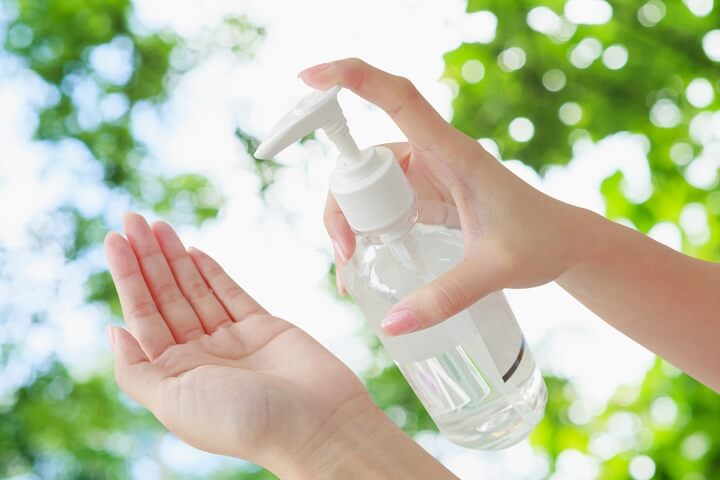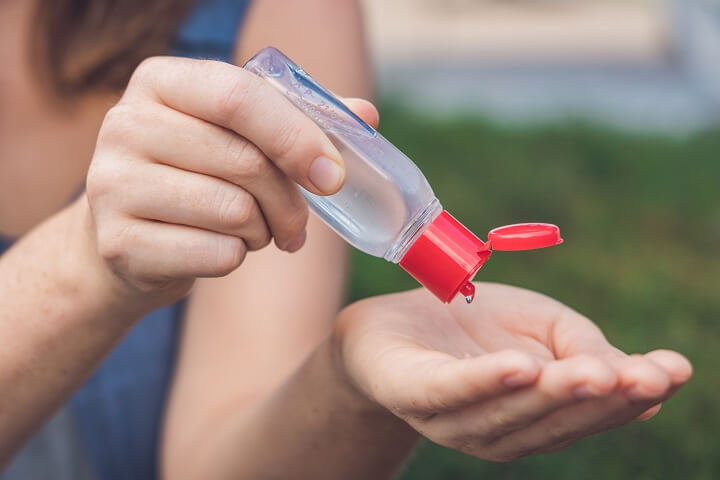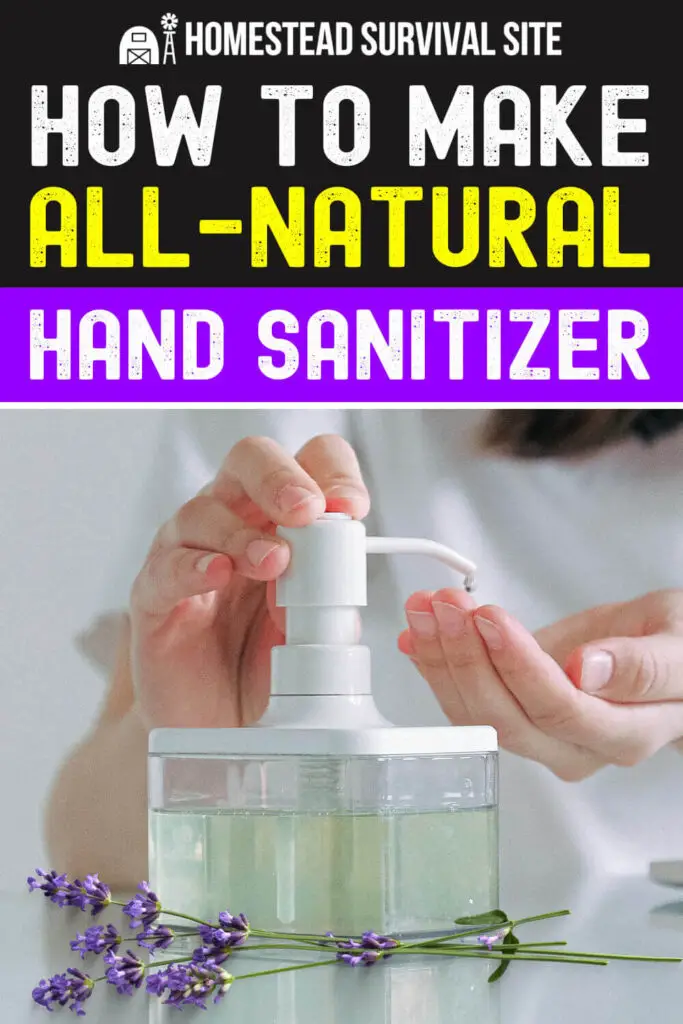Estimated reading time: 5 minutes
Remember March of 2020? Because of the coronavirus pandemic, countless people panicked and bought up all the toilet paper, face masks, and hand sanitizer. Nowadays, it's a lot easier to find hand sanitizer, but that could change fast if another pandemic happens.
Hand sanitizer is often marketed as being able to kill 99.9% of all germs and bacteria. If you're concerned about germs or the fast-spreading coronavirus, or you just have a weak immune system, you should understand the importance of having hand sanitizer around.
In this article, we’ll discuss the importance of hygiene during a disaster such as a pandemic, why you should consider learning how to make your own hand sanitizer, and two DIY recipes you can try.
Want to save this post for later? Click Here to Pin It On Pinterest!
Why Sanitation and Hygiene Is Important During SHTF
Sanitation is easily one of the most overlooked issues when it comes to emergency preparedness. Most people don’t realize how bad sanitation is going to get when the grid goes down, and along with it, running water, garbage trucks, hospitals, and so on.
Garbage will no longer be picked up, a lot of people won’t have access to basic medical care, and personal hygiene items such as soap will be in short supply. This is why you need to be on your A-game when disaster strikes. Keep yourself and your home as clean as you can manage.
Hand sanitizer is not a cure-all solution for sanitation and hygiene in our everyday world, and it won’t be in a major disaster scenario either. Nonetheless, there’s no denying that sanitizer can also play a major role in helping guard you against major germs and viruses.
What Kind of Bacteria Does Hand Sanitizer Kill?
There’s a reason hand sanitizer is always used in hospitals instead of antiseptic soaps: they kill most viruses and bacteria. They do this by killing microbial cells thanks to the presence of rubbing alcohol. Sanitizers will disrupt the outer coat of a virus, and for bacteria, they will interfere with the cell membrane.
However, it should be noted that hand sanitizer can only kill most kinds of viruses and bacteria. There are a small handful of common germs that hand sanitizer will not kill – these include norovirus, e. Coli, salmonella, and MRSA.
Should You Go With Alcohol-Free Hand Sanitizer?
If you’ve done any shopping for hand sanitizer before, you’ve no doubt come across both alcohol and alcohol-free hand sanitizers. You might be wondering which is better.
The truth is that alcohol-free hand sanitizer can be very effective. However, it’s also true that alcohol-free hand sanitizer can become contaminated. This is because alcohol is an in-solution preservative. Hand sanitizer that lacks alcohol is therefore much more vulnerable to contamination.
Yes, hand sanitizers that contain alcohol can also become contaminated, so long as the alcohol content is not controlled properly, but it's much less likely.
DIY Hand Sanitizer Option #1

For hand sanitizer gel to be effective, it needs to have at least a 60% alcohol concentration. Alcohol can kill bacteria through the process of desiccation, or rapid evaporation. If you have a lower concentration of alcohol, then there won’t be enough to evaporate and dry out the bacteria.
Here's what you'll need:
- 2.5 cups of 91% isopropyl alcohol
- 1 cup of 100% pure aloe gel
- Essential oils (optional)
Simply mix the isopropyl alcohol and aloe gel together in a container like one of these.
This will create an alcohol concentration equivalent to around 63%. For added scent, you can add a few drops of your favorite essential oil. In fact, there are some essential oils that can increase bacteria killing effectiveness in DIY hand sanitizer, such as tea tree oil.
DIY Hand Sanitizer Option #2

Here's what you'll need for this one:
- 10 drops of lavender essential oil
- 30 drops of tea tree oil
- 1 tablespoon of vodka
- 1/4 teaspoon of Vitamin E oil
- 8 ounces of aloe vera gel
Here's how to make it:
- Mix the Vitamin E oil with the essential oils in a bowl or container.
- Add the remaining ingredients and stir together well.
- Be sure to shake the solution before each use.
It’s also a good idea to ensure that essential oils are not exposed to light, so use colored bottles over clear ones.
Conclusion
Hand sanitizer will be a very important commodity during a grid-down disaster. And on top of that, learning how to make it on your own is a great way to become more self-sufficient.
Like this post? Don't Forget to Pin It On Pinterest!
You May Also Like:




Can’t get your hands on isopropyl here in the UK, and they say that vodka is not strong enough
Same in Australia. No isopropyl alcohol anywhere and even white vinegar, bleach, methylated spirits, hydrogen peroxide and even aloe vera gel beginning to disappear from the shelves. Most vodka available is no more than 40% so ineffective and fairly expensive. Current websites are all pushing isopropyl alcohol as the main ingredient of natural sanitizers but it looks like soap and water will still be the mainstay and vinegar the next best and available option. At least until the panic subsides and the supply lines resume normal action.
What if I don’t have aloe vera gel? Any substitute?
Will any goop do if I don’t have aloe Vera? Thanks
I wouldn’t count on it.
Since this came out, I have learned that aloe does not work in hand sanitizer. I forget exactly why, but it has to do with breaking down something that shouldn’t be broken down. It convinced me at the time, but I don’t remember it. What they said was this. Take your essential oils and put in the bottle, then fill the bottle with alocohol and shake, and of course shake before use. They said the alcohol will dry out the skin. You can use aloe later (after it has all dried) if you need to use it to soften your hand. So it is NOT necessary to have the aloe when making the sanitizer. There are two oils. I forget the name exaclty, but like ravensara and ravinstarra or stera or something. Those oils were said to be the BEST EOs at killing the most viruses. I am going to add tea tree and lemon to that. Might add orange too. Orange is good at killing microbes, plus I just LOVE oranges. Limes are good too. With the tea tree, it should smell pretty rank though. Haven’t made my new batch yet with the ravinstarra, so not sure how much that will smell. Also good for putting into liquid hand soap.
Wife and I tried the first recipe back when the pandemic started. Our solution turned orange and got browner as time went on.